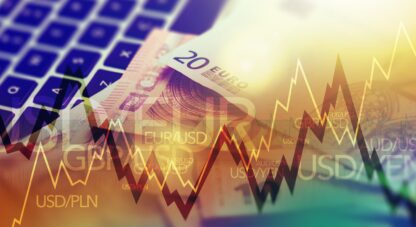Podcast: Play in new window
- Biden Admin Has Drained Our Strategic Oil Reserve By 40%
- Higher For Longer Prompts A Treasury Buyback/Bailout Program
- Chinese & Japanese Currencies Near Break Levels
“We have to be cautious of policy choices over the next six to 12 months—and this is public policy, this is fiscal policy, this is monetary policy—we have to be aware of the policy choices over the next six to 12 months. Or, to be honest, we may be past the point where we have to consider what the consequences are we will be dealing with, because I think we’re already dealing with the consequences of choices already made”. –David McAlvany
Kevin: Welcome to the McAlvany Weekly Commentary. I’m Kevin Orrick, along with David McAlvany.
I was just laughing with a friend, Dave. We were thinking back 50 years, some of the Johnny Carson jokes that were coming out during the oil embargo. I was 10 years old at that time. I mean, this is 1973, but I still remember some of the jokes because everybody, everybody was affected by the long gas lines here in America. A lot of people didn’t really realize the geopolitics and the economics behind it.
David: I had a rough segue this morning as I was trying to explain to my kids the importance of Yom Kippur and what happened 50 years ago, and it was a desperate need for protein. And—
Kevin: Oh, you were having a lapse?
David: All that I could find were Hebrew National franks. So we went from talking about the hot dogs being kosher to Yom Kippur.
Kevin: To Yom Kippur.
David: Yeah.
Kevin: To the oil embargo.
David: Of course. Because in every year, at this time, this is Yom Kippur. It’s also the beginning of Ramadan. But 50 years ago, we were on the eve of an OPEC oil embargo.
Kevin: Yeah.
David: And so that was part of the conversation. What do rising oil prices tell us about recession and inflation, unemployment, the mix of the two, stagflation, both then and now?
Kevin: I’ve got to laugh because last night when I was over at your house and your kids, they’re reading Augustine right now, they’re asking me questions. And I looked over at your wife and I said, “What are you interested in right now?” And she said, “Oh, I don’t know. It’s been awfully busy, but we are leaving for Istanbul next week.” And I said, “Only in a McAlvany household do you talk about oil embargoes, Yom Kippur, leaving for Istanbul, and Augustine.” I mean, this has all been within about 12 to 15 hours. I don’t think our house talked about any of that stuff. So, yeah.
David: Well, I wish I was going with them, but my oldest son and my wife are heading over for a conference there. And of course, I’m very curious where the exchange rate is going from here to there. 27 to 1 is the most recent.
Kevin: Wow.
David: And the lira has been under extreme pressure, and that’s with interest rates at north of 30%.
Kevin: So the trip could cost a lot more than you think as time goes on, however long that she’s there?
David: Well, what it reminded me of is that in Turkey they may very well have the same kind of rates that Argentina has, the difference between the official rate and the blue dollar rate. If you’ve got high levels of inflation, you’ve got the powers that be saying what reality is. Then you’ve got the man on the street living what reality actually, actually is.
Kevin: So let’s tie this into oil because we were just talking about an embargo. Okay, what do rising oil prices tell us about recession, inflation, the mix of the two, what you were saying? How about our strategic reserve in oil?
David: It’s ironic that Biden is considering a convenient drain of the strategic petroleum reserve. He did it last year, but it’s back on the table. And this is outside of a supply crisis, and on the eve of an election. And it’s ironic, but it’s consistent as a political exploit. The strategic petroleum reserve was created because of the events 50 years ago this week, this timeframe, as a response to a supply shock. We never wanted to see us in a vulnerable position again.
So we’re now off the peak of 726 million barrels. That was the max held in the SPR, and we’re now sitting around 400, 450 million barrels. And that’s after last year’s drain. Clearly politically motivated; suppress the oil price. It was convenient.
Kevin: So we’ve gone from 726 million barrels in our reserve—
David: Mm-hmm.
Kevin: that’s basically like having a savings account so that we’re not vulnerable—to just a little over half that. We’re at 450—
David: Exactly.
Kevin: —million barrels?
David: So consumers are going to be even more impacted this year. Of course, that’s why it was drained, to provide some relief for the consumer. But the impact this year, you’ve got the oil price increase stretching towards $100 a barrel, you’ve got the consumer, at least 43 million of them, as of next week, as we head into October, who’ll have to resume student loan payments alongside other rising expenses.
The timing of the rise in oil and of course the ancillary product, gasoline prices, is brutal. And I believe OPEC and OPEC+ know this, and they know the impact of rising prices on the consumer, and they know that this is a way of impacting the election.
So US shale production has just rolled over here in the United States. If we had latitude to increase production, we’re actually moving into the decline phase with your rates of production falling off the proverbial cliff. And that’s what happens with shale. If it’s not drill, baby drill, you’re going to see a decline in production. That’s what we have today.
Russia and Saudi Arabia, are they in any mood to do the White House a favor? Not particularly.
Kevin: Well, yeah. Going into an election year, I mean, there’s still 450 million barrels. Is Biden going to use that to try to continue to keep gas prices low?
David: Listen, this is not a first. He’s following the Clinton and Obama playbook, reducing the strategic petroleum reserve leading up to the election to ease gasoline prices for consumers. That improves the perception of the economy. And look, lest you think this is a partisan critique, Trump did the same thing. He drained the SPR by 10% to garner votes. So this is just political games.
Kevin: Yeah, but Biden’s like 40%. This is—
David: This is the biggest drain.
Kevin: —serious.
David: This is the biggest drain in recent history by the Bidens. Now off 40% from the peak. 40% seems to be Biden’s magic number. 40% is also his vacation days since he took office.
Kevin: I’m seeing an awful lot of YouTube videos trying to show me that Ukraine is winning the war. But what I read, it doesn’t sound like it is. And yeah, if I go back 50 years, Dave, war, talk about the sabers rattling. At the same time we had the OPEC oil embargo, Israel was being attacked.
David: And I just can’t let the five-month thing go because we prize productivity here in the United States. If you’re starting in a new job, expect to get one week per year. If you’ve been there sometime, maybe it’s two weeks. If you’ve got tenure, maybe you get a month, and now you’re beginning to compete with what—
Kevin: But Biden’s taking half the year off.
David: —Europeans take, as a point of fact: we have to have our month, month and a half off—
Kevin: Six weeks.
David: —in August. Six weeks, right?
Kevin: Yeah.
David: Well, yeah. This is five months of every year—
Kevin: Is vacation.
David: It’s interesting, and he’s new to the job.
Kevin: But I don’t think the President in 1973 was taking five months off, and he still had to react to a war in the Middle East.
David: ’73, you had the annual Yom Kippur celebration. Remember, it was a unique stress point for Israel. You had the coordinated attack from Syria through the Golan Heights. You had Egypt through the Sinai Peninsula. This is the fourth Arab-Israeli war. The goals were pretty simple: the total destruction of Israel. And yes, there was taking back, recapturing the territory lost in the third Arab Israeli war, which was 1967, the six-day war. 1973, conflict lasted 19 days. You had thousands killed and wounded. And because the west supported Israel, OPEC members retaliated with the embargo on oil.
Kevin: Well, and how much did Nixon really support? I mean, Nixon and Kissinger are the guys we’re talking about at this point. Golda Meir asked for ammunition when—
David: And the answer was no. Yeah.
Kevin: Initially.
David: To be clear, the US ignored Golda Meir’s request for munitions and support. Only when the Soviets started resupplying the Egyptians, did we concede and decide to support. So I think this is just the reality of US foreign engagement.
Kevin: Yeah.
David: Our allies have learned that you can trust Americans to do the right thing—after all other options have been exhausted.
Kevin: Mm-hmm.
David: And so the Soviet interest in the Middle East was a compelling motivation.
Kevin: Right. Go back to 1973. I mean, we’re talking Vietnam isn’t even over yet.
David: Well, it’s just wrapping up.
Kevin: Yeah, it’s just wrapping up. At that time, the Cold War was very, very cold and hot at the same time.
David: Yeah. So you’ve got the supply-driven price spike in the oil markets, a recession thereafter. This oil move basically further entrenched the inflation that was already present in the economy. And again, we’re talking about the radical fiscal policies, dealing with war, also the social policies of the era, trying to make the world a better place. But commingled, you’ve got the scars of stagflation, gas lines, rising unemployment. 1973, inflation was 6%. It wasn’t at an extreme, but it was up from 2% just a few years earlier.
Kevin: Gosh, that sounds familiar.
David: And unemployment was under 5%—
Kevin: Mm-hmm.
David: —that year, but it was on its way to over 9% by 1973. So this is like, I was born in the middle of a recessionary hell, 1974, between these pillars, ’73 and ’75.
Kevin: A true McAlvany.
David: Yeah.
Kevin: A true McAlvany. But yeah, it does sound familiar, doesn’t it? Low unemployment at that time, but inflation jumping from 2% to 6%, geopolitical turmoil, and we’ve got oil in the mix.
David: And unemployment by 1982 reaching its peak of 10.2%. Note that inflation, unemployment, and interest rates peaked as gold ran out of bull market buyers, right? So you had this radical increase in the price of gold from $35 to $850.
Kevin: That’s 1980 you’re talking about, right, from ’73 to ’80?
David: Yeah.
Kevin: Yeah.
David: Yeah, yeah. And so this is a 25-fold increase in the price of gold—
Kevin: I remember it.
David: —in this period of time.
Kevin: I remember it.
David: Financial assets were primed at that point to do exceedingly well after that period of hard asset outperformance, right.
Kevin: Yeah.
David: We now have the reverse. Hard assets primed to do exceedingly well after a period of financial asset outperformance.
Kevin: Yeah, and I don’t—
David: It’s a really interesting setup.
Kevin: I don’t think we’ve seen anything yet. When you’re talking about oil, didn’t oil go up about 10-fold? You talked about gold going up 25-fold. Oil went up 10-fold, if I remember right.
David: Yeah. Three bucks. Actually, below three bucks to over 33. Gold from 35 to 850. Silver from a buck 56 to $48. You had your ag commodities. They dramatically repriced between 1971 and ’74. That reflected the dollar devaluation and the death of the Bretton Woods monetary agreement. And then, of course, there was a series of weather-driven production shortfalls, which kept prices higher. They kind of plateaued at higher levels for the whole decade.
Kevin: And things really changed as you ended that decade. I remember how impressionable I was because I was in high school in 1979, 1980. I remember Ted Koppel. A lot of the listeners are going to remember Ted Koppel, and Nightline was founded because we had the Iranian hostage crisis. We had the invasion of Afghanistan, we had the high inflation. Jimmy Carter was just a mess, okay. Yeah. And then also you had gold topping out at about, what, almost 850 bucks an ounce.
David: Yeah, exactly. So as inflation is heating up, as interest rates are beginning to climb towards their high levels, as gold is in fact moving into gear, fast-forward to 1979, the Soviet incursion into Afghanistan and that potential threat of Russian dominance of the Middle East oil reserves. That sent gold to two times its inflation-adjusted price.
Kevin: Yeah, it did overshoot, didn’t it?
David: Absolutely. Doubled in six weeks from 400 to 875. 850 is generally what people refer to. That’s on a per-ounce basis. Oil was pressed higher, and this was by a second supply shock in the decade. We talked about the first one from the embargo.
The second one was following the Iranian Revolution and a drop of nearly 5 million barrels a day from Iranian supplies to the global markets. And so crude this second time around goes from 13 to 34. Again, incredible inflationary pressure.
Kevin: That was an overshoot too, wasn’t it?
David: It’s in less than a year—
Kevin: Yeah.
David: —again, on that second supply shock. In the current context, supplies have been artificially tightened by OPEC. And demand—this has been sort of the X factor throughout 2023—has actually been brisk. Brisk enough to push prices up over 30% since June.
Kevin: So I wonder, though, is there a solution? Because we talk about how high inflation was and how gold was skyrocketing. Reagan got into office after that, and Paul Volcker of the Federal Reserve, who actually, to be fair, helped create the problem decades before. Paul Volcker came in, cigar smoking Fed chairman, tough guy, basically raised the rates dramatically.
In fact, do you remember, Dave? You interviewed Paul Craig Roberts, and he was with the Reagan administration at that time, and they hated Volcker because it looked like with the increase of interest rates, Reagan probably would not be reelected and that we would go into a recession. Those were rough times, but you got to admit, what Volcker did, it reversed the inflationary trend.
David: Yeah. Let me go back real quick to the oil price because while we’re talking about two and 3X moves in the oil price and a 30% move today, that’s not equivalent, clearly. But what we have today that we didn’t have then is the amount of money and credit in the system. And so that was provided primarily through monetary policy, which has been beneficial to asset prices. You still see that.
We talked about the record levels in the Z.1 report, 174 trillion in terms of total asset value, subtract out the debt, total net worth for households, 154 trillion. That’s all well and good. The interesting thing is, we’ve begun to see inflation of an uncontrollable sort, and not particularly in asset prices, but in consumer prices when we’ve transitioned from monetary policy to fiscal policy.
Kevin: So we’re highly leveraged right now. It’s a different day and age.
David: It’s highly leveraged, and we’ve got desperate politicians willing to spend seemingly insane quantities of money and hand it out, and just push it into the system. So again, fiscal policy handouts. This is aka helicopter money. It’s different than monetary policy stimulus because it tends to recycle within the financial markets, whereas fiscal policy is more money on the street through one channel or the other. It could be private sector, could be corporate sector, but it’s not trapped on Wall Street. That’s, I think, an important point. So you mentioned Volcker—
Kevin: Could Volcker do what he did now with everybody leveraged the way they are?
David: That’s a key differentiator as well. Volcker entered the fray, eventually crushed the inflation of the ’70s with double-digit interest rates. We can’t take that kind of pain today, and it has to do with just how leveraged the speculators are. I grant you, this is just a token example, but your zero-days-to-expiration traders who are in the options market, they’re basically leveraged a thousand to one. So I mean, when we talk about leveraged speculators, when we saw Archegos bite the dust a year ago, it was because they had 50 to one leverage.
We’re not talking 50% leverage like you might have in a margin account, or your loan to value on a home, no, we’re talking about leveraged speculators that are 10, 20, 50, 100, 1,000 times leveraged. So you can’t take the kind of pain today from higher interest rates that a Volcker would’ve brought in because you’ve got the leveraged speculators, you’ve got the commercial banks. Think about the hundreds of billions in assets that are underwater and represent insolvency for the commercial banks, and the only free pass they get is because they don’t have to mark those to market.
That is a big deal. Leveraged speculators, commercial banks, even moderately leveraged businesses would get crushed by those higher rates. The best that central bankers across the globe can pull off is moderately higher rates. We’re there now. But holding them for a longer period of time.
Kevin: Is that what they’re just desperately hoping for? That if they can just keep it moderately higher for a longer period of time—
David: No. I would say no. They’re not hoping that they can hold them here for a longer period of time. They’re hoping that they can raise them and lower them quickly. What they’re coming to terms with is the fact that they may be stuck holding them at a higher level for a longer period of time.
Kevin: Same question though. If they’re stuck, we have low unemployment right now, so let’s just play this thought experiment. Could we actually have a much better economy than what you’re seeing right now, and can we handle these higher rates?
David: For a period of time. If you raise them, yes, we can handle them. And it’s been a surprise to many of the economists out there that nothing is broken yet. It is a question of how long they stay at these levels because it’s a refinancing of debt, which ultimately becomes consequential for households, for corporations. I experienced this. So I borrowed money from a bank to complete the purchase of this business from my father, and it’s a fixed rate for five years, and then it goes market on me at the end of five years, and it’s a 10-year amortization.
So what am I going to do? Well, I’m going to pay it off at the end of five years. I’m not going to hold it all 10 because I don’t know what rates are going to be. I’m not willing to see the readjustment in rates to a significantly higher level. Do you know what kind of stress that would put on me? Right? So I’m fine for the next three years. We’re at the end of two years already—
Kevin: Because you fixed it for the five.
David: Right. So that’s what I’m saying. If we kept rates at a higher level throughout this period and I didn’t have the ability to or the willingness to pay it off faster, what am I looking at? I’m looking at a doubling in interest fees, a doubling in interest costs.
Kevin: It’s like a fuse. How long is the fuse? You see these movies where they light a very short fuse and they just barely have time to get out of the room.
David: Five years for me, which I hope business stays very strong through that five years. It may influence my vote in 2024. No, I’m kidding. Not kidding.
Kevin: Of course, of course. You play very conservative, Dave. That’s the beauty.
David: Well, one could argue that with low unemployment currently and both interest rates and inflation, yes, they’ve come up and they’ve come up quickly, but we’re merely at historical average levels. There are still interesting market dynamics and asset price adjustments still ahead of us. I mean, again, we’re just getting back to average levels if you’re talking about unemployment. Average levels, if you’re talking about interest rates. These are not excessively high. They’re only excessively high relative to the 5,000-year lows which we were at just a few years ago. So it feels like interest rates have moved a lot, and they have off a very low base.
Kevin: Let’s just look. I mean, we were zero on interest rates for a while, or negative on interest rates. Even oil.
David: We’re still below the level of, say, a hundred year average.
Kevin: A hundred year average.
David: We’re still below that.
Kevin: Right. I was going to say even oil, if you recall the day that oil was what, 30, $35 a barrel? Negative. Okay. So yeah, we have had a strange period of time, but the readjustment, let me ask you a question about unemployment, because unemployment right now, I mean, is very low. Let’s look back at history. What happens when unemployment is high?
David: Well, again, I would bring this back to interest rates. If I as a corporation have to deal with higher interest rates, my biggest line item as an expense is payroll. And if higher rates and the question of solvency is forced on me, the average corporate America, highly leveraged. We’re not very leveraged as a company. But if you look at the average company, pretty highly leveraged, and you’re having to absorb higher rates, what do you go to? Your highest line item? You can cut toilet paper costs and go from three ply to one ply. Nobody likes that. But that also doesn’t save you that much money. So if you want to cut toilet paper costs, that’s one thing. It’s easier—
Kevin: Turn the lights off maybe at night, that type of thing.
David: But it’s easier to hit big-ticket items. And that’s payroll. That’s payroll. So we are in a cycle where it’s unavoidable to see an increase in unemployment. But what would exaggerate the trends of increasing rates and increasing unemployment, taking us above those average levels? I think you have to remember that geopolitical deterioration is a real thing right here and right now.
Kevin: Oh, very much.
David: And actually getting into an official recession where it is pronounced, it’s understood, and people are adjusting accordingly.
Kevin: Are people looking at world politics right now? I mean, are they looking at the geostrategic or the geopolitical?
David: More than in even recent years. You’ve got corporate executives. If you look through quarterly reports where they’re talking about how they’re performing, what’s creating headwinds or tailwinds for growth through those quarterly reports. Just in 2023, so far, we’ve had 12,000 mentions of the word geopolitics. That’s three times what it was two years ago.
Kevin: That’s unusual.
David: So there’s more of a focus, more of a concentration on this issue of deglobalization, of re-shoring, on-shoring, and that’s a record. That’s a record. 12,000 mentions just year to date. Certainly not indicative of a mood of cooperation of multilateral munificence. What desperate measures will have to be brought into place in the wake of state capitalism failing in China? This is on people’s minds because they realize there’s real stress and strain within the Chinese economy, and geopolitics may actually be an issue that we have to deal with for the first time since the end of the Cold War.
Kevin: Well, we have a president that takes almost half a year of vacation off.
David: But he’s surrounded by good people, really good people.
Kevin: I think I read that. Yeah. Don’t worry. Yeah, put him back in office because he’s surrounded by good people. He has to be—just to be able to stand up, I think.
David: Trump did too. He surrounded himself with really good people. Really.
Kevin: Yeah. I think he called it the swamp, and then he didn’t drain it.
David: They’re good people. Perhaps misunderstood
Kevin: Good people. Well, okay, so let’s go back. Let’s go back to unemployment. What were historically some of the worst times for unemployment that we’ve gone through in the last a hundred years?
David: The easy decade, 1930 to 1940.
Kevin: Sure. Yeah, the depression.
David: Fast forward to where the conversation began, Yom Kippur and all that, from 1973 to 1983, you had a series of years where it progressively got worse and cumulatively in that timeframe, that 10-year period, second worst decade next to 1930 to 1940. And then it’s a little bit more sporadic. 2008 to 2012 was no picnic. The pandemic took rates back to depression-era levels, but that was only for a year and a half. So—
Kevin: That was hard to measure too back then.
David: The unique kickoff for the 1970s, we were building off the Johnson-era guns and butter policies, but the unique kickoff was the oil shock. And history doesn’t have to repeat, but it’s said to rhyme. And here is Biden setting the stage for a Carter-esque economic debacle. It’s another version of the revenge of the old world economy. People think about oil and oats, so yesterday. We’re moving beyond fossil fuels and we’ll all be green tomorrow. Who even cares?
Everyone should care because it’s one of the things that’s going to drive us crazy in the context of recession, rising unemployment, and major economic concerns. I just think about the naivety of what you see in, for instance, California. California needs to spend nearly $400 billion in grid upgrades to accommodate the energy transition targets that they’ve set for themselves. Where’s the money going to come from?
Because this is not federal money. This is state money. I wonder which residents will still be there and not have moved to Idaho, and Colorado, and Arizona, and Florida to avoid what is going to be a very onerous, a very onerous increase in taxes. I am not saying in a negative way or in an illegal way, if I choose to leave a state and plant my flag somewhere else, I can do that. And you’ve seen that. This is a perfectly legitimate move to avoid the onerous tax implications of bad policies. And I say bad because they just simply— They’re not affordable. This is not economics that actually works. This is an abusive form of economics and it’s going to come at a very high cost.
I do wonder which residents in California are going to remain? Who’s going to pay the 400 billion for grid upgrades so that we can move away from the old world, from fossil fuels. As the world more broadly seeks to embrace a new energy system and neglects the old one, the old energy system is in the process of exacting a very painful revenge.
Kevin: And that takes us back to draining the strategic petroleum reserves because it was a shock. It was a shock to the supply, basically, that caused the problems of the ’70s. Now we’re highly leveraged. Are we able to handle a shock?
David: Jim Bianco highlighted this in recent days. The Biden administration is keeping a further SPR drain on the table. What would you do to get reelected? If the SPR, strategic petroleum reserve, if it’s fully drained, the cavities fill with saltwater and the engineering work to recapture the space is virtually impossible. So if we drain it much lower, we’re talking about an irreparable harm done to the energy security of the country. The SPR was created in the 1970s so a sudden supply shock could never again impact the US. It was meant for a national emergency, not a personal emergency, buying down the oil price as a gift to potential voters.
Kevin: Well, last week, Dave, we talked about how gold was hitting all time highs in the Asian currencies, China, Japan, India, and that’s saying something about currency shock. That’s another thing that we have to look at. I mean, you’re talking about oil supply shock, but a lot of these countries owe money in dollars and their currency is just falling off the cliff.
David: Yet the Chinese and Japanese currencies remain major concerns for us. 150 on the yen, 7.34 on the RMB represent the battle lines. 150 is certainly significant, but 7.34 is where the RMB has already traded. A move past those levels, 150 and 7.34, you’ve got big trouble unfolding. So in terms of financial market fragilities, you can look at these two currencies and you can look at the rise in global yields that is in the bond market as the most consequential trends in play. The yen breaking 150 breaks the 1990 lows.
Kevin: Wow.
David: And at that point, you’re peering into an abyss, and we’re there, 148 and change. It’s like we’re knocking on the abyss. Rising yields, of course, these drive the value of bonds lower, but as yields rise, the rate at which you have to discount future corporate earnings is also impacted. So lest you think, oh, well, it’s just the bond market that’s in play in terms of risk. No, no, no. When you do a discounted cash flow valuation of an equity, you’re using the current rate of interest as your discount number, correct? So there is more here in play, right?
We are an overvalued market to begin with, but rising rates and this recalibration of the DCF models brings stock prices significantly lower than they currently are. Basically what I’m saying is nothing is priced for higher rates, and the adjustment phase two higher rates is going to be incredibly painful. And again, this is assuming that rates stay where they’re at or go higher. Maybe we’re all wrong and rates go lower. I could certainly make a case that given the short interest in Treasurys today, that there’s going to be a covering event, 600 billion short is nothing to sneeze at.
So we could in the short run next week, for the next two months, have a significant rally in bonds and a decline in yields. That would be normal. But what I’m arguing is that that is just a relief of the speculative pressure valve. Six hundred billion short, they’re now on the wrong side of the trade, they’re covering, things are happening, prices are changing, they’re moderating. It’s some relief to corporate America for a short period of time, but the trend of higher for longer, that’s not going away.
Kevin: And it’s not just a US phenomenon. We were talking about Volcker. Back when Volcker was raising rates, he was making decisions for the United States, not the world. At this point, the rising rates, they’re a global phenomenon.
David: It’s happening, and rising yields, they’re a bit like a needle pressing in on the top balloon of risk assets. The US 2-year and 10-year at highs going back to the early 2000s. The US 10-year topped 4.546 this week. Short rates are still even higher than that, maintaining the yield curve inversion. Long rates are actually coming up a little bit now. At this point, bonds are incredibly oversold. A bounce could ensue, easing of rates in the short term.
But again, I go back to the bigger picture, in a way, from sort of the traders’ day-to-day mindset: Jamie Dimon’s comment, JPMorgan’s CEO, that the world is not ready for the fed funds rate at 7%. He’s right. He’s right. They’re hardly ready for it at 5 or 6. So the whole community of economists and central bankers that’s assuming that the tightening cycle is already complete insofar as increases are concerned, now we must bide time and allow the effects of the existing rate structure to permeate the financial markets—
And there is a possibility and there’s a variety of influences which could take rates to Dimon’s 7%. Global debt’s now $307 trillion. Just the quantity of debt and the ability to continue to finance it, because it continues to grow exponentially, it means that financing and refinancing is a larger, bigger, and costlier expense going forward. Global debt now is $307 trillion, up $10 trillion year-to-date. That’s a debt to GDP ratio globally of 336%. Global yields rising on that stock of debt, that amount of debt, it’s a huge issue.
Kevin: Okay, so let’s pretend like you’re a banker. I know I shared this story with you. I’ve got a client who’s a banker who a couple of years ago, when all the stimulus money was being showered at him, everybody was making deposits and they wanted interest on their money, he couldn’t loan money quick enough, and the temptation was to go out and buy long US government bonds because that was the only place he could actually, or a lot of bankers could actually get any kind of return. He didn’t do it. In fact, he even went to his board of directors and asked if he could buy gold. They said no, but it would’ve been a good idea.
So here’s my question. You’ve got all these banks with all these long bonds in the bank rating books, they’re A-rated banks, B-rated banks, but it’s because they’re not having to actually sell that long-term debt that’s gone down as interest rates have risen. This is my question. I read something yesterday and I asked you about it. I said, Dave, have you heard anything about the Treasury Department buying bonds back? This sounds strangely like a bailout of those banks that got stuck. Are you thinking possibly that we might be contemplating as a nation a buyback of these bonds that are in the red?
David: Yeah, I mean, it’s not speculation. If you want to go to the US Department of Treasury’s website, you can read the Josh Frost presentation to the International Swaps and Derivatives Association Trading Forum, and he discusses it candidly, that this is a 2024 event. Treasury Department is talking about a bond buyback program starting in 2024. For me, it raises the question, what kind of worries are they addressing? What balance sheets do they see as Bear Stearns-like in the present environment such that they would need to engage in improving or increasing the liquidity of the Treasury market? It’s fascinating to think about current oversupply. There’s a lot of debt out there and current diminished Treasury liquidity. You have to find even more people interested in owning it as you’re exponentially increasing the supply. Then add to this the Treasury needing to continue to issue new bonds next year. It’s not like we’re dealing with—
Kevin: They’re still selling bonds as they’re bailing and buying back.
David: Right. So if they’re still issuing new debt, what business do they have buying back, at the same time creating a buyback program. It smells like a bank bailout to me. That’s my conjecture, of course, but I think, how do you explain it any other way? Taking those debt instruments that would otherwise impair a bank balance sheet as interest rates stay higher and perhaps even go higher yet. They’re trading at steep losses. We’re already into the hundreds of billions of dollars in assets that have not been marked to market, but do show those massive hemorrhaged losses. Is it possible for the Treasury to provide relief? Of course.
Look, in the ’80s, we had the Resolution Trust Corporation. Remember? They were created to liquidate real estate assets and provide balance sheet relief to the savings and loans. This feels like a version of the RTC for the bond market. Look, the central bank has a role. You may think, oh, well, it’s to manage the currency, it’s to manage price, it’s to make sure that employment is maximized. But really what they’re there to do is make sure that there’s continuity and stability within the commercial banking industry. Continuity and stability at any price. And we’ve seen continuity and stability of the commercial banks come at a very high price. It’s come at the stability of our purchasing power. We bought it. We got it. It’s a stable system, all except for one thing, please don’t look at the value of the purchasing power of your currency.
Kevin: You know what would bail those bonds out, Dave? And this is what’s not being said. Whatever meeting he was talking at. What’s not being said is that interest rates are not coming down anytime soon, because you want to bail those bonds out, just get interest rates back down. Those banks are not going to be at a loss if interest rates drop back down. What he’s saying is interest rates are going to be higher. Isn’t that what’s being implied?
David: That’s what it implies. Why would you need to relieve the pressure from banks?
Kevin: Exactly. If interest rates drop, you don’t have a problem.
David: Yeah, I think the most disturbing visual, which is now being imagined by Wall Street—and this is no surprise. In our conversations this has been sort of common stuff, but it’s just now beginning to sink in for Wall Street. They’re just beginning to reflect on this higher for longer issue. John Authers from Bloomberg describes Table Mountain, Table Mountains in South Africa, and he says, “This appears to be the reality, and this is the adjustment which Wall Street’s coming to.” It’s not [unclear], which is massive peaks in South America. It’s not a sharp rise in a fall of interest rates that’s most concerning to Wall Street. You’ve got an erratic move which can destroy some things in short order, but the larger problem is with Table Mountain as a picture of rates increasing and then staying higher for longer. The issue—and again, it sounds like a broken record on this—it’s the rollover risk for governments. It’s the rollover risk for corporations. It’s what they encounter over an extended timeframe that bites a little bit this year, a lot more next year, a lot more the year after that.
Kevin: It’s that fuse. It’s that fuse we talked about. Everybody’s got a fuse. They have to re-up that debt.
David: It’s the maturity schedule. Going back to China, Evergrande missed a $500 million payment this week. Well, the debt came due. No one was willing to finance it. It doesn’t matter that in the marketplace they can be expected to pay up to 300% interest on the debt. No one was willing to finance it. They can’t make the payment. They’re done. This is the nature of bankruptcy. This is the nature of insolvency. You either have the money to pay back or you borrow it. You go get it from someone else. Replace the existing debt with a new form of debt. You renegotiate with your existing creditor and say, “Look, I can pay you back, but on an extended terms or at a higher rate, but just don’t make me do anything now.” Otherwise, the clock stops and you’re done. Bankruptcy.
Kevin: Default.
David: So in an interest rate spike, there are entities that will fail because they’re unable to access the credit they need, but the higher for longer, this is what permeates the entire economy and begins to transform and really begin to pressure not just Wall Street firms, but all of corporations. You want to see the unemployment part meet up with the inflation part. It’s coming to a theater near you, and that’s where you get stagflation. So month after month after month, the higher for longer, as we’ve been saying, literally for months, it forces the average yield paid higher. And over time, that has a profoundly negative effect on economic growth and on profitability, the earnings of corporate America.
In a less credit-driven economy, this would be less consequential, but our addiction to debt— Our national debt, mind you, passed $33 trillion last week. We might’ve forgotten to mention it. $33 trillion. Just another trillion, don’t worry about it. It makes the average interest paid a very important variable. Because now, what you’re talking about is the negative compounding of a debt burden. So when you think about positive returns, it’s earning 2% on 100,000 or 5% on 100,000, and you’d like to see a higher interest rate to be able to positively compound. But when you owe money and that interest variable is growing, now you’re negatively compounding. And the higher the rate, the more aggressively it compounds, to the point where you can’t do anything. I mean, there is a point of no return.
Kevin: When we were talking about history, it takes me back. When I first started working for your family back in 1987, Paul Volcker was still the Federal Reserve chairman, and our debt at that time was an astounding $3 trillion, $3 trillion. It’s now $33 trillion. So in my career here, the national debt has gone from 3, which was— People were shocked because under Carter— From George Washington through Jimmy Carter, we got to 1 trillion. By the time Reagan was almost to a second term, we were at three, and now we’re at 33.
David: We’re at 33, and the Congressional Budget Office already pencils out that we’ll be at 50 within a very short period of time. So think about this. How does gold not re-price to reflect this sort of balance sheet debauchery?
Kevin: Yeah.
David: All of a sudden, it seems very modest to think that gold, which averaged $700 back in 2007, could trade at 7,000.
Kevin: Interest rates were about where they are now, and a lot of the numbers were about where they are now in 2007. And gold was what? A little under 700 bucks.
David: 696 was the average in 2007, and we’re just getting interest rates back to that level. Obviously, the demand for gold has increased significantly.
Kevin: And we’re in the 18, 1900s right now on gold. Well, let’s go back to Evergrande because you said they missed a debt payment. Half a billion-dollar debt payment. That’s an awful lot of money. That’s a Chinese company that was making a whole lot of money.
David: That’s just one payment in a series of payments. So you have He Keng, who’s the former deputy head of the China Statistics Bureau, he believes that the 1.4 billion Chinese—that’s the population—could not fill all the empty apartments that exist today.
Kevin: And that ties right in with Evergrande because they finance—
David: He actually said he’s not convinced that if the population was double that, close to 3 billion people, that they would fill the existing empty apartments. Most analysts estimate that there’s between 65 and 80 million empty units. And again, he believes the number’s considerably larger.
Kevin: That’s called a see-through building.
David: Well, this is where Evergrande and Country Garden, just two of those companies— We’re talking about $550 billion in liabilities just between those two companies. 550 billion.
Kevin: And they missed a half-a-billion-dollar payment.
David: It’s really easy to lose perspective on how big these numbers are. Half a trillion dollars in liabilities in two companies. This is unbelievable. Evergrande misses 500 million in a debt payment this week. Both their prior CFO and CEO have been arrested. Last month, if you’re looking at reported capital flight in China, last month, keep that in mind, hit $49 billion, US dollars, in capital flight. The Chinese economic picture worsens, and the odds of a geopolitical issue increase proportional to their desperate situation. At the same time, we’ve got leadership which has shifted the priorities. Xi is not Deng. Xi Jinping is not Deng Xiaoping.
Kevin: He’s more than happy to return to communist values. Now, he calls it a little something different, but it’s command and control.
David: We’re slipping back in time towards the Cultural Revolution. We’re not talking about capitalism with Chinese characteristics. We are rapidly degrading to command and control dynamics with very few reflections of capitalism left. And we’ve talked about some of the major Wall Street firms diminishing their footprint in country. We had Nomura Securities, one of their main guys in China, he’s not allowed to leave the country. Officials are being purged at an increasing rate. The foreign minister recently, the defense minister recently, most of the generals overseeing the Chinese nuclear arsenal. It’s a balance, actually, between firings and disappearances where we don’t know if they’ve been thrown in jail. They’re just gone, right? Xi’s insecurity, if you could put his political insecurity on a chart, it would look like NVIDIA’s stock year to date.
Kevin: This is a man who’s doing command and control, so his anxiety is soaring. My anxiety is soaring, Dave. It doesn’t matter whether you’re Democrat or Republican. We want 80-year-olds-plus in the White House who take almost half a year off for every year they work. They almost get a full year off.
David: Well, and keep in mind, Xi is looking around at who his friends are, and he’s getting the band back together. Who’s showing up? You’ve got Bashar al-Assad, you’ve got Vlad Putin, you’ve got Kim Jong Un. If this was a musical gathering, this could be like Megadeth. It’s like, “What? Who are these people?” These are the specialists in biological warfare, chemical warfare, nuclear. This is crazy.
Kevin: Yeah. But we’ve got 80 some odd-year-olds who’ve got really good people around them.
David: They’ll solve the problems. One last thing because on China. Vanke, who’s the best Chinese developer around, and we know some folks that work there, very reputable. And they’ve been like the last man standing in terms of real estate developers in China. They’re under Moody’s review for credit downgrade. Will they join the others and instead of paying interest rates in the teens, upper single digits to lower double digits, will they enter the fray with triple-digit, 100, 200, 300% interest rates?
Time will tell. So far, they’ve been able to avoid that. But you’re right. Every day that passes, thinking about US politics, every day that passes and the RNC and the DNC don’t put forward reasonable candidates— Kevin, I think they do further reputational damage. They’re creating a generational credibility crisis. They’re creating a generation of cynics.
Kevin: Well, think about your kids. How do you explain to your kids what’s going on in politics right now and give them hope?
David: Look, this is where the best and the brightest go. Just keep in mind the path and the journey to Washington, DC. Now, I will tell you, I think some of the best and brightest are the lobbyists in DC because they’ve figured out what works and how to work the system. And I’m not saying best and brightest in a complimentary fashion. I think in some respects, that’s just being clever. But you’re right, we’ve got a generation, my kids, your kids, who can look and say, “Look, out of 300 million people in the US, we’re willing to elevate and rerun Trump and Biden and continue to abide by this rulership of old white men.”
Think about it. On the left, you’ve heard this criticism that our culture has been run by old white men. And I don’t think that’s fair because we’ve got Diane Feinstein who’s 89. We’ve got Maxine Waters who’s 84. Finally, Feinstein is exiting. Pelosi at the young age of 83 hanging on like she’s getting over a hangover every time she’s on the stage. It’s crazy.
Kevin: She’s never going away.
David: Do you know this is the oldest House and Senate in over 120 years?
Kevin: Really?
David: Yeah. In fact, I think it goes back to 1789. It’s the only year we were led by an older mix. Just for the sake of averages, maybe it’s a good thing that the senator from Pennsylvania identifies as a 13-year-old, just doing his part to lower the perceived averages.
Kevin: I guess that identification thing helps. But to be fair, there are people in their 80s. My mom’s 83. Your dad’s 83. My mom practices piano four hours a day.
David: Well, I know one man in Mexico City that seems like the Energizer Bunny. He’s able to maintain an incredibly robust professional schedule in his mid-80s. Nothing seems to have changed in the 20 years that I’ve known him. But I can tell you, my dad’s 83, and to be frank, a half-day is a full day with the health challenges that aging has presented.
Kevin: I think about that with my mom. I wouldn’t want her to be president right now. Practicing piano four hours a day and playing at church on Sundays is different than being president.
David: The presidency is one of the most challenging jobs in the world, perhaps that’s why. And this is MSN reporting this, by the way, which I thought was interesting. Perhaps that’s why MSN has reported, this was early August, actually August 7th, that in just two and a half years, Biden has already taken 367 vacation days.
Kevin: This was in two and a half years, he’s taken more than a year, 367 vacation days.
David: So for 40% of his time in office, someone else is doing the job. And we know it’s not Kamala. Think about that. The Oval Office is open and we’re actually considering putting the man back in that requires five months off the job to be able to stumble through the other seven months. Our very best options for a rerun, Trump and Biden. This is like—
Kevin: It’s like a comedy.
David: Tell me that SNL hasn’t already covered this because this is inexhaustible material, and they’re so good.
Kevin: And they do great presidential skits. We need to start seeing this one.
David: But the problem is, if we can’t go from the joke to some sort of a shift and positive change, we are talking about destroying institutional trust. One of the most recent polls showed that less than 16% of Americans have complete trust in US government. I wonder why.
Kevin: I’d like to try to find, what are those 16% thinking?
David: It’s a good question, but it also demonstrates, more than anything, this absurd duopoly that exists in American politics. On this basis, if we’re willing to say we don’t need a success story and we don’t have to be able to walk from here to the kitchen sink without tripping and falling, why not run Jimmy Carter again? As long as we’re mixing politics, theater, and farce.
Kevin: Okay, so lest we end on politics, because I can’t do that. I’m sorry. I cannot end on politics. It’s too depressing. So this may be happier. What do rising oil prices tell us about recession, about inflation, the mix of the two? That’s where we started.
David: Well, I think it says that we have to be cautious of policy choices over the next 6 to 12 months. Sorry, I’m bringing it back to politics again.
Kevin: Oh, ouch.
David: Our policy choices over the next 6 to 12 months—and this is public policy, this is fiscal policy, this is monetary policy—we have to be aware of the policy choices over the next 6 to 12 months or— Frankly, to be honest, we may be past the point where we have to consider what the consequences are we will be dealing with because I think we’re already dealing with the consequences of choices already made.
* * *
You’ve been listening to the McAlvany Weekly Commentary. I’m Kevin Orrick, along with David McAlvany. You can find us at mcalvany.com, M-C-A-L-V-A-N-Y.com. And you can call us at (800) 525-9556.
This has been the McAlvany Weekly Commentary. The views expressed should not be considered to be a solicitation or a recommendation for your investment portfolio. You should consult a professional financial advisor to assess your suitability for risk and investment. Join us again next week for a new edition of the McAlvany Weekly Commentary.















